

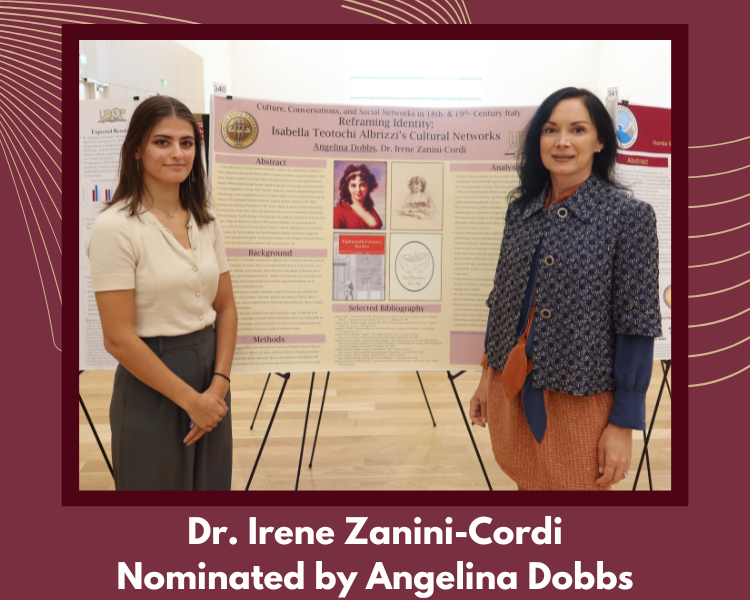
Undergraduate Faculty Research Mentor Award
DR. IRENE ZANINI-CORDI
The Undergraduate Faculty Research Mentor Award for 2024 was presented to Dr. Irene Zanini-Cordi.
Read more about Dr. Irene Zanini-Cordi
The Undergraduate Faculty Research Mentor Award for 2024 was presented to Dr. Irene Zanini-Cordi for mentoring UROP student Angelina Dobbs in research on the Culture, Conversations, and Social Networks in 18th- & 19th- Century Italy.
Dr. Irene Zanini-Cordi
"Working with UROP students has always been a delight. Usually, I am the first professor with whom they establish a personal relationship since they have taken mostly large, general education classes. They are eager to learn, and I gain a lot from their enthusiasm and the fresh eyes they bring to my projects (not to mention the tech and social media know-how!) This year is proving to be a particularly exciting experience. I needed only one student for my project “Culture, Conversations, and Social Networks in 18th- & 19th- Century Italy,” but the applicants’ enthusiasm for my interdisciplinary research on salons culture and women writing carried me away, so I decided to build a team of 4 students with majors in Political Science, French, English, and Editing and Writing. I then turned what I had conceived as a “simple” editing position (to help revise my book manuscript) into a full-blown “hands on” team project, with the goal to offer students as many learning opportunities as possible, and to create the matrix for a future undergraduate course in English."
— Dr. Irene Zanini-Cordi, from her mentoring statement
“Regarding my UROP project, I drew on Dr. Zanini-Cordi's vast knowledge of Italian history and intimate experience with primary texts to develop a solid idea for my project. I struggled to pick a topic and align my interests in Psychology and Literature, but she helped me connect the dots and find a primary text to research. She has gone beyond the scope of my project, indulging my curiosities about publication and niche Italian culture. The cool historical facts and exciting stories she tells have enriched my understanding of the context of the time. Under her guidance, I have developed critical thinking on gender and class and the implications of both controversial topics throughout history. I have also become more confident in conducting research and asking necessary questions."
— Angelina Dobbs, UROP student 2023-2024, from her nomination letter
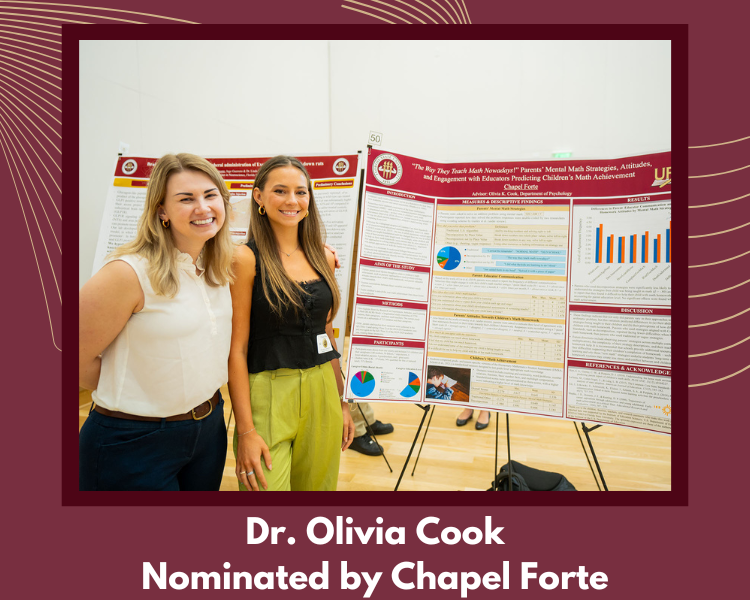
Post-Doc Undergraduate Research Mentor Award
Dr. Olivia Cook
The Post-Doc Undergraduate Research Mentor Award for 2024 was presented to Dr. Olivia Cook.
Read more about Dr. Olivia Cook
The Post-Doc Undergraduate Research Mentor Award for 2023 was presented to Dr. Olivia Cook. Dr. Cook mentored UROP student Chapel Forte on Parents’ Mental Math Strategies, Attitudes, and Engagement with Educators Predicting Children’s Math Achievement
Dr. Olivia Cook
"My approach to directing and advising undergraduate research is driven by my philosophy towards life-long learning, as I view the collaboration between faculty and students as the primary drivers of new ideas and lines of inquiry for the field of developmental science. In order to nurture these collaborative relationships, my approach towards mentoring students is rooted in tenets of Maslow’s hierarchy of needs. Fostering meaningful relationships, trust, and community with my mentees is necessary in order for creativity and critical thinking to flourish. In doing so, I view the ideas of my mentees as authentic and key to moving the research forward – as they are the ones who have been transcribing conversations, observing behaviors, and developing an expertise as scientists."
—Dr. Cook from her mentoring statement
"Dr. Cook has encouraged me to apply what she has taught me about research in thinking outside of her project. After I compiled a list of topic/career aspects that interested me, she helped me explore different organizations and paths. She connected me with friends and colleagues who had experience in these fields and encouraged me to reach out to some of these organizations. As we have continued to dedicate weekly hours to the UROP project and my researchdevelopment, we have also brainstormed ways to continue my development after UROP. Dr. Cook helped me apply for an IDEA Grant and agreed to supervise my project if I am awarded funding."
—Chapel Forte, UROP student 2023-2024, from her nomination letter

Graduate Student Undergraduate Research Mentor Award
Sierra Morandi
The Graduate Student Undergraduate Research Mentor Award for 2024 was presented to Sierra Morandi.
Read more about Sierra Morandi
The Graduate Student Undergraduate Research Mentor Award for 2024 was presented to Sierra Morandi. Sierra mentored Thersendie Belizaire during their work on Exploring Differential Instruction Strategies to Foster Students’ Sensemaking in Science Classroom.
Sierra Morandi
"As a mentor, I am committed to supporting and fostering students holistically as they develop and pursue their interests within our context, whether this be in the classroom or through a research project. Being a teen mom my approach to guiding and supporting mentees will always be rooted in empathy, resilience, and the understanding that everyone is doing the best they can on their way to figuring out who they are and what they want to be. My mentoring philosophy revolves around the belief that effective communication is not only essential for success but also for fostering a safe environment where a mentee can be and develop their own whole selves. "
—Sierra Morandi, from her mentoring statement
"Sierra is an outstanding mentor. She is always there with words of encouragement, ready to support and uplift her mentees. Her optimistic attitude and contagious energy create an atmosphere that is driven and enthusiastic. Sierra has demonstrated her unrelenting devotion and dedication to our research endeavor by working nonstop to make sure we get the tools and assistance we need to be successful.
Sierra's ability to stimulate critical thinking is one of her strongest suits. She pushes us to think creatively and to experiment with different ideas and methods. She gives us direction and encouragement at every turn while letting us think on our own. Sierra fosters our curiosity and gives us the confidence to go further into our studies, pose questions, and expand our understanding."
—Thersendie Belizaire, UROP student 2023-2024, from her nomination letter

Graduate Student Undergraduate Research Mentor Award
Alex Kallen
The Graduate Student Undergraduate Research Mentor Award for 2024 was presented to Alex Kallen.
Read more about Alex Kallen
The Graduate Student Undergraduate Research Mentor Award for 2024 was presented to Alex Kallen. Alex mentored Morgan Brown and Valerie Johnstone on their project: Interactions Between Anxiety and Alcohol Sensitivity: Alterations in Brain Response to Monetary Loss.
Alex Kallen
"While this was my first year as an Undergraduate Research Opportunity Program (UROP) mentor, I have been advising students at FSU for about seven years. Broadly, my mentorship philosophy is to foster curiosity in a safe, collaborative environment where my mentees feel comfortable, motivated, and encouraged to ask questions. In other words, I hope to provide mentees with a foundation for coming up with their own ideas, in a context where they know I am available, caring, and dedicated to helping them have greater confidence to reach their academic goals as well as develop a sound framework for accomplishing complex tasks. To this end, my primary objectives for mentoring are: a) establish a sound understanding of the particular topic, with focus on how it applies to my mentees’ interests; b) emphasize the importance of being inclusive, having respect and consideration for the unique aspects of each individual; and c) maintain a comfortable environment with ongoing collective learning and consistent support to my mentees. This philosophy has been directly shaped by my own experiences as a mentee. Put briefly, my mentors over the years could be categorized as either elusive and minimally helpful, insensitive with difficult feedback, or collaborative, motivating and insightful; the last of which serves as a guide for the following objectives and strategies."
—Alex Kallen, from his mentoring statement
"Coming to Florida State, one of my largest goals was to work in a research lab learning the topics that excite me the most and through UROP, I had the ability to do exactly that. In the weeks where we were tasked with finding our perfect fit, I remained confident whichever lab I would join would provide me with the best experiences and further my passion for research and I am proud to say my experiences have far exceeded expectations.
My mentor is one of the kindest and more caring people I have met and he truly takes the time to understand any difficulties I may be having and address it in an eloquent manner. Since the beginning, he has been thorough in his teachings and has conveyed his knowledge in a simple to understand manner. Diving into a complex research project, I was hesitant at first I would not be able to understand what was going on but Alex made sure I felt confident at every step. He constantly asked how he could improve and always took the time to listen to suggestions which further demonstrates his unique passion for teaching and mentorship."
—Valerie Johnstone, UROP student 2023-2024, from her nomination letter

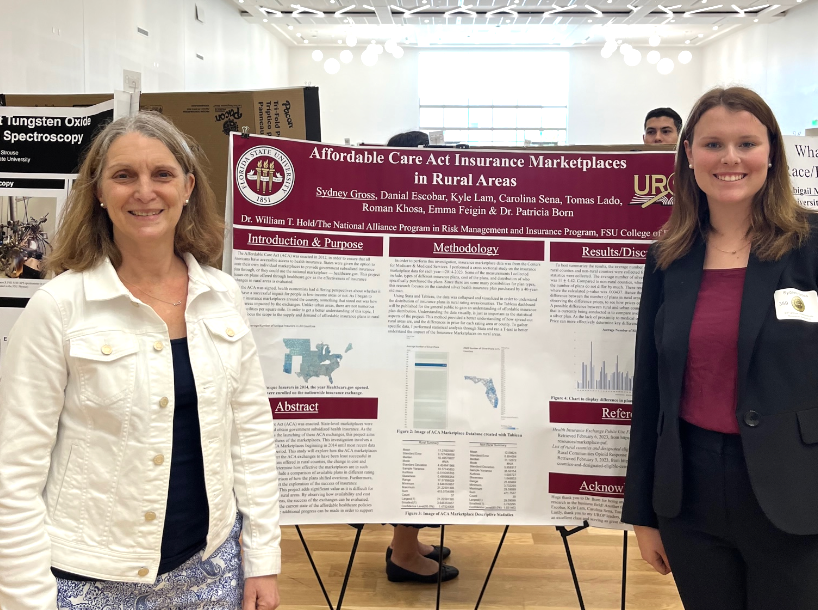
Dr. Patricia Born
College of business
Undergraduate Faculty Research Mentor Award
The Undergraduate Faculty Research Mentor Award for 2023 was presented to Dr. Patricia Born for mentoring UROP student Sydney Gross in research on the Affordable Care Act in Rural America.
Undergraduate Faculty Research Mentor Award
The Undergraduate Faculty Research Mentor Award for 2023 was presented to Dr. Patricia Born for mentoring UROP student Sydney Gross in research on the Affordable Care Act in Rural America.
Dr. Patricia Born
"I feel it is our obligation as mentors to push the envelope on how we guide our students. It is important to provide context to the research, and this means bringing in timely, real-world facts, and examples into the research discussions. Current events in my discipline – risk management and insurance – offer some excellent opportunities for highlighting the context in which we conduct research, e.g., the devastation from recent hurricanes or proposed legislation involving the use of genetic test results in life insurance. With all of my mentees, I try to introduce a healthy dose of social and public policy considerations. At the end of the program, each student should be able to make the connection between his/her research findings and the larger implications for society. Through the UROP program, they develop critical thinking skills that can enhance their understanding of the world we live in.."
—Dr. Patricia Born, from her mentoring statement
“Dr. Born is the epitome of an ideal research mentor. Her dedication to research and my growth has inspired me in many ways. Dr. Born not only set me up for success in UROP, but she challenged me in a way that fueled my passion for research in the insurance field. As a mentee, I was guided through the many steps of the research process. I got the opportunity to complete a literature review, manipulate data, code data, visualize information in Tableau, and present to the public. She dedicated hours merging and compiling data files so I would not be overwhelmed by both the Stata software and copious amounts of unorganized data. With this, she encouraged me to explore the software I was learning further and trusted me to do what I thought would be best to represent the data. This opportunity to see many aspects of the research process was eye-opening. I was never left to do the mundane tasks that she did not want to do. Instead, she made this process fun."
—Sydney Gross, UROP student 2022-2023, from her nomination letter.

Dr. Asha Mathew
Institute of molecular biophysics
Post-Doc Undergraduate Research Mentor Award
The Post-Doc Undergraduate Research Mentor Award for 2023 was presented to Dr. Asha Mathew. Dr. Mathew mentored UROP student Laila Hayes on "Improving the binding affinity of the integrase binding domain in host proteins for HIV-1 virion incorporation."
Post-Doc Undergraduate Research Mentor Award
Dr. Asha Mathew
"I consider mentoring as a learning opportunity for myself to grow and refine my skills and professional development. I want to help my students to develop their skills, grow their confidence and encourage them to pursue their research goals. Gaining knowledge and increasing the skill set would be the constant goal so that both me and the students can make a meaningful impact in the scientific community. Open, genuine communication will be the key to my relationship with the students and the students can always communicate their problems and confusions about the project and I am always available to hear and clarify their doubts. I am here to create a learning environment that challenges the students to think critically and to expand their knowledge. My expectation is that we would grow as the best version of ourselves and as great scientists together towards the end of this UROP program."
—Dr. Mathew, from her mentoring statement
"Prior to UROP, I had no official research experience in the hard sciences. I knew participating in the assistantship would be a challenge, but I didn’t anticipate the sheer amount of support I would receive from my mentor. Asha Mathew, despite her years upon years of experience, has been nothing but patient with me in my learning process. Even from the first day I interviewed with her, she made the intimidating world of academia feel less daunting and more human. Asha gave me both creative freedom and experimental guidance in developing my project; she would show me exactly how to do a specific technique, such as a transformation or running a PCR, then allow me room to do it myself with my own project. During this process, Asha would share her past experiences when she was in my position as a student, telling me about her success, mistakes, and everything in between. Hearing her stories made me feel more comfortable being new to the lab; she made me feel like I belonged there despite my lack of experience and reduced the internal pressure I’d felt to be perfect. Essentially, she created a safe space for me to make mistakes, learn, and grow into a better researcher, mentee, and student.
—Laila Hayes, UROP student 2022-2023, from her nomination letter
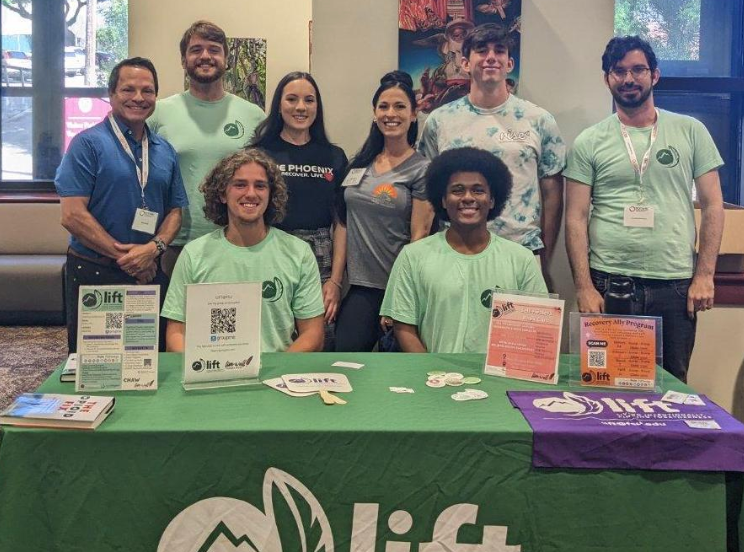
Chelsea Shore
Department of educational leadership and policy studies
Graduate Student Undergraduate Research Mentor Award
The Graduate Student Undergraduate Research Mentor Award for 2023 was presented to Chelsea Shore. Chelsea mentored Daniel Campos, Elisabeth Anthropova, and Michael Gipson.
Graduate Student Undergraduate Research Mentor Award
Chelsea Shore
"My mentoring strategies often include an intake or exploratory meeting with students where I can learn about their current skill set, their future goals, and the type of experience they are seeking from my mentoring. We often establish a routine work schedule that include at least one weekly in-person meeting to review their independent work and collaborate on next steps. I orient them to the two project management systems, Basecamp and Airtable, and empower their autonomy in completing their work. I approach working meetings in ask-versus-tell strategies where mentees share out their independent work with a group, justify their reasoning, and can pose questions for future directions or delegate tasks to others. All mentees are required to submit SMART goals for the semester and complete mid- and end-semester evaluations. In efforts to build social capital and community, all my mentees meet at least once per month to discuss their projects and collaborate across projects."
—Chelsea Shore, from her mentoring statement
Throughout my experience as a UROP research assistant, Chelsea Shore has been an outstanding research mentor. I can speak on behalf of her seven other UROP students in expressing her unrelenting dedication to us and the program. Throughout these two semesters, Chelsea has effectively shown me what it takes to be an effective team member in a research setting. Her assignments and expectations challenge me and other students to develop critical thinking and independence skills which will be key skills to have moving forward in future research and graduate program endeavors. Being a graduate coordinator in the collegiate recovery program, UROP mentor, and Ph.D. candidate, Chelsea exemplifies a commendable work ethic, dedication, and innovation in her field. Chelsea has been an exceptional role model and example of what I hope to be in my future research and graduate-level endeavors.
—Daniel Campos, UROP student 2022-2023, from his nomination letter


Undergraduate Faculty Research Mentor Award
Dr. Michael David Franklin
"Good mentorship is a collaboration between mentor and student. I see undergraduate students as important collaborators whose questions and novel approaches to problems drive the success of my public history research, for which effective public engagement is crucial. Knowing what students new to public history do not know helps me think productively about how to tell the story of my research findings to a general audience. Thus, I have the opportunity to shape and inform how my students formulate questions and how they use methods to answer those questions, and in doing so I create clear structure for them in which to grow as researchers. At the same time, I listen to my students, foster conversations among them about contemporary examples of publicly engaged history, and use this information to better understand my own blind spots and assumptions. This exchange is mutually beneficial: as they grow as novice researchers and young professionals learning how to draw from their curiosity to work together and creatively solve problems, I grow by absorbing what their new ideas teach me and by gaining new ways of seeing the world. Ultimately, I balance my mentorship and project leadership with this democratic mode of collaborative knowledge production. The end result is the creation of a dynamic community in which students and I are fellow interlocutors, researching the world around us in a mutually transformative way."
—Dr. Michael David Franklin, from his mentoring statement
“While during winter break, visiting the SFPL was by far one of my most memorable academic experiences from my first semester at college. While finalizing our UROP contract, I had been excited to hear that so much material was held not too far away from my hometown in California. I knew I’d be going home for winter break, but the prospect of me having the opportunity to visit the SFPL was initially just that: a prospect. While my tasks as a UROP mentee started with transcription work, the freedom that Dr. Franklin was willing to give me and my fellow UROP student opened up a variety of opportunities for the both of us. Dr. Franklin continuously stressed letting us use our own passions to direct our involvement, whether that be working to design a digital version of a museum display, helping with outreach, partaking in interviews, writing a blog post related to our project, or even working on a podcast, Dr. Franklin was always open to new ideas.
Not only was he willing to hear our ideas, but he was committed to implementing them as well. Throughout the semester, Dr. Franklin worked to get in touch with archivists at the library and figure out what I would have access to once there. The archivists were so well informed about our project and what was needed when I got there, thanks to Dr. Franklin and his thorough communication, that I was not only able to work more efficiently, but I felt supported and less stressed about my previously minimal archival experience. Throughout my three days at the SFPL, Dr. Franklin was also on standby, taking moments out of his travels to answer my questions and thank me for what I was doing. I am thankful to have him as my UROP mentor, as he allowed me to expand my role as a mentee and play a significant role in the curation of our museum exhibit."
—Nadia Rassech, UROP student 2021-2022, from her nomination letter

Dr. Daniel Dunleavy
COLLEGE OF MEDICINE
Post-Doc Undergraduate Research Mentor Award
The Post-Doc Undergraduate Research Mentor Award for 2022 was presented to Dr. Daniel Dunleavy. Dr. Dunleavy mentored UROP student Conqualla Scott on "Social Determinants and Comorbidity in Minority Groups."
Post-Doc Undergraduate Research Mentor Award
Dr. Dunleavy
"I would describe my teaching and mentoring philosophy as being student-centered and humanistic. This is influenced by two factors.
First is my educational and professional background. I am a social worker by education and training. Social work, as a profession, places high value on self-determination and emphasizes the importance of human relationships. The goals of a client (or in the academic setting: the student) are front and center and the task of the helper (i.e., the social worker, teacher, mentor, etc.) is to create a safe environment in which to build trust and to foster growth, change, and self-actualization. As a researcher and academic, I try to incorporate these values into the mentoring relationship – emphasizing student-centered learning and objectives."
—Dr. Dunleavy, from his mentoring statement
"Daniel Dunleavy exemplifies all of the qualities that make a phenomenal mentor. From the moment that I met him; he was nothing short of amazing. My entire UROP experience has been exceptional and exceeded my expectations. I began this experience with a minimal amount of knowledge regarding research and I struggled with my ability to participate in such an important research study. Daniel has not only been helpful professionally and academically, but personally as well.
My journey as a first-generation, minority student at a predominantly white institution has been very difficult and hard to adjust to. From the moment that we met, Daniel reassured me of my abilities and helped me understand that it is okay to be imperfect. He helped me reaffirm that I am fully capable of achieving the goals that I set. During the fall semester, I especially experienced imposter syndrome because my classes were significantly harder, and I had no one in my classes who looked like me. This was very harmful to my mental health and negatively impacted my college experience. During this time, even though we were virtual, and he was dealing with his own personal matters with maternity leave, he was by my side and helped me. I really appreciate how he was willing to listen to my grievances and aid in my adjustment to being in a place where I am often ostracized."
—Conqualla Scott, UROP student 2021-2022, from her nomination letter

Bobbie Renfro
MARINE BIOLOGY
Graduate Student Undergraduate Research Mentor Award
The Graduate Student Undergraduate Research Mentor Award for 2022 was presented to Bobbie Renfro. Jennifer mentored Remi Ventura in researching "The Aquaculture of Sponges, the Coral Reef Superheroes, in a Closed Laboratory System."
Graduate Student Undergraduate Research Mentor Award
The Graduate Student Undergraduate Research Mentor Award for 2022 was presented to Bobbie Renfro. Jennifer mentored Remi Ventura in researching "The Aquaculture of Sponges, the Coral Reef Superheroes, in a Closed Laboratory System."

Bobbie Renfro
"As a mentor, I strive to provide mentees with the same opportunities that my past mentors provided to me, a safe and supportive environment to: 1) follow curiosity, 2) take on new challenges, and 3) explore the world of marine biology, both through scientific research and public outreach, even if these are not their primary career aspirations. While providing these opportunities, I work also to guide mentees in developing basic professional skills which will benefit them in a variety of careers, should they decide that marine biology is not ultimately for them. By using marine biological research as a framework to develop these universally beneficial skills, I hope to simultaneously inspire an excitement for the natural world and promote professional success for my mentees no matter where their career path leads."
—Bobbie Renfro, from her mentoring statement
"Bobbie Renfro is an outstanding mentor, and I could not have asked for a better one. While many UROP students are assisting graduate students or Ph.D. candidates on their research, Bobbie really let me take the reigns in deciding how we would spend our time. She outlined multiple projects that she was interested in and let me choose which one to move forward with. We chose to try and cultivate sponges in a closed system and she was super supportive throughout the entire process. She was always there when I had questions or needed guidance and provided me with the utmost support. We worked together to determine the most successful set up for the project and she allowed me to test my ideas, while still providing me insight.
Unlike other research mentors, she is very understanding, flexible, and wants me to get as much as I can out of this program. She always gives me the opportunity to learn and delve into different projects around the lab, answers my abundance of questions, and even sends me resources she believes I may be interested in. I interviewed for many different positions when UROP first started and Bobbie was the only mentor to make me feel like she was looking out for my education above finishing her thesis and Ph.D. She is excited to hear what I have to say and work closely with me. Bobbie is always looking for ways to improve my ability in the lab, even bringing in prior students of hers to discuss my projects with and connect with"

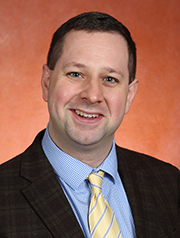
Undergraduate Faculty Research Mentor Award
Dr. Robb Tomko
"In one-on-one mentoring situations such as my scientific laboratory, it is my duty to impart on the next generation of scientists the craft of academic research, in addition to more pragmatic skills essential for today’s scientists, such as grantsmanship, budgeting and accounting, time and personnel management, and networking. I firmly believe in leading through actions. As a mentor and scientific role model, I aim to make all of my scientific andadministrative actions transparent, so that my mentees can learn from them. In some cases, however, there is simply no substitute for frontline experience. Therefore, I try to actively include mentees in processes such as conceiving their scientific studies, designing their experiments, and crafting manuscripts, presentations, and posters. I also encourage my mentees to continuously draft and revise their scientific goals and conclusions. These experiencesfamiliarize them with the iterative nature of many academic and technical endeavors, teach patience and determination, and perhaps most importantly, prepare them to tackle lofty goals in their chosen careers or to besuccessful in subsequent graduate education. Importantly, I strive to impart strong scientific ethics and academic honesty upon my students by focusing on the goal of answering the question, not getting the desired result.
I view my teaching and mentoring as an investment in young academics; these men and women will shortlybe my colleagues and collaborators. By forging strong relationships with my students based on clarity, honesty, and rigor, I help assure there will be a cadre of talented and objective thinkers to carry on academic discovery into the future."
—Dr. Robb Tomko, from his research statement
“Through my UROP experience so far, I have never met someone as funny or brilliant like Robb. Robb makes science fun and interesting which is always important for us undergraduates because we can sometimes not understand what is happening at times. You can tell just by his teaching and motivation that he cares for his students and wants all of them to understand what is clearly going on in the lab and what exactly is happening through each step when we perform science. As complex as the information can be, Robb is great at explaining material to someone like me who doesn’t really have the full grasp of what is exactly going on. Robb is committed to teaching his students how to do research in molecular biology, but he is also committed to bringing joy in students, he understands that students go through stress all the time so bringing laughter is important. As you work more with Robb, you can tell that he understands diversity is important in the workspace and that research is not a place to discriminate. Robb understands that everyone is united by science and everyone should be treated fair when it comes to it. When it comes to mentoring, Robb uses a specialized way to teach which includes lab meetings, discussions, and actual research. When it comes to lab meetings, Robb makes sure the undergraduates understand what is going on and explains information clearly, which always helps to clarify the material. Throughout his already busy day, Robb takes time away from his schedule just to proctor me when we are in the lab doing various things. I love his dedication to his students as it is clear that he loves to teach and values his undergraduate scientists."
—Sathvik Bilakanti, UROP student 2020-2021, from his nomination letter
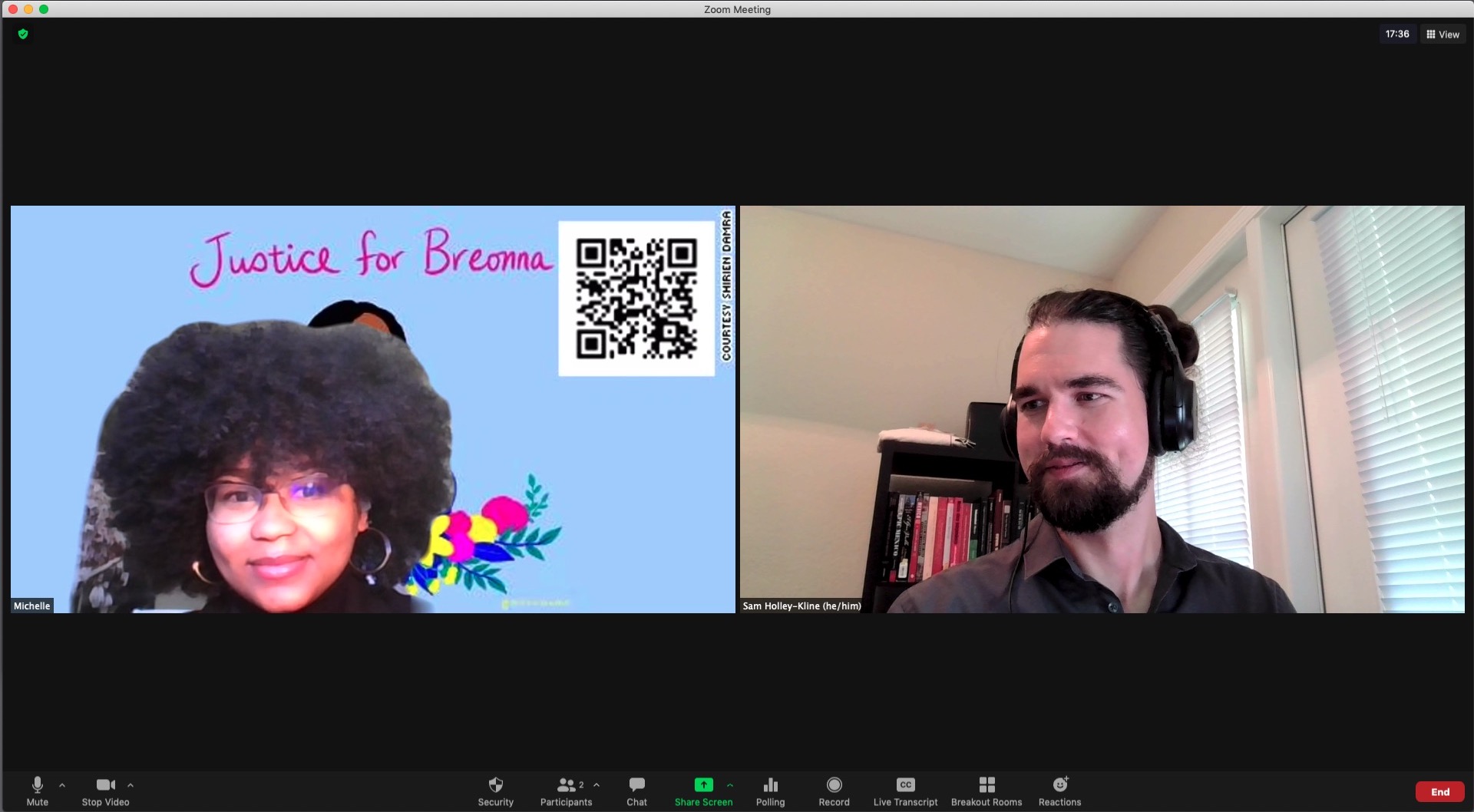
Dr. Sam Holley-Kline
DEPARTMENT OF HISTORY
Post-Doc Undergraduate Research Mentor Award
The Post-Doc Undergraduate Research Mentor Award for 2021 was presented to Dr. Sam Holley-Kline. Dr. Holley-Kline mentored UROP student Michelle Evangelista on "Histories of Extractivism in Indigenous Mexico.
Post-Doc Undergraduate Research Mentor Award
Dr. Holley-Kline
"To begin, I meet students where they are, so that they are able toaccomplish individual objectives that meetbroader standards. Wefirstdiscuss mutual expectations and needs. Sometimes, the result is a structured, proactive approach. My UROP student collaborators are new to the craft of research. Before beginning our project, I used a Canvas Org site to set up shared Dropbox folders, Zotero accounts, Google Sheets, and introductory readings, such that we shared common references. I followed up with individual students during biweekly meetings, and discussed progress with each as they developed their ideas. During monthly group meetings, we discussed the broader project and re-checked expectations. In other cases, meeting students where they are requires a resourceful, reactive approach.The two students for whom I served as a thesis committee member at the Universidad Autónoma Metropolitana were experienced, having already completed field research and data analysis. As they requested, I provided digital copies of hard-to-locate sources and multiple rounds of thesis feedback. Meeting students where they are enables me to provide a common foundation with which to further develop each collaborator’s unique contribution—depending on their needs.
Meeting students where they are requires sensitivity to students’ backgrounds, experiences, and socialpositions. Research suggests that emotional support and motivational scaffolding are important strategies for students from minoritized communities.1In the service ofequitable development,I prioritize student mentees, responding within the hour to their e-mails and not limiting my meeting time with them. Such relationships allow me to discuss issues of concern to students: the importance of speaking heritage languages, for example, or the politics of identity markers(Latinx or Latine?). I back up this support with a willingness to work outside the bounds of the formal research assistantship: I have editedIDEA Grant applications for my UROP student collaborators, have offered (and written) letters of recommendation, and introduced students to other faculty membersto further develop their interests.."
—Dr. Holley-Kline, from his research statement
"During all this, Dr. Holley-Kline has supported me and my research goals in UROP and outside it as well. Realizing the love I had for research, I sought guidance from Dr. Holley-Kline about implementing my own interests into the field, by pursuing my own research through an IDEA grant. Even when I had doubts about what I wanted to do, I was always greeted with kindness and advice on what to do next with my dreams and ideas. The resources and skills I learned about were critical in continuing my journey in research and UROP, as an IDEA grant applicant and future UROP leader.
Dr. Holley-Kline's commitment to supporting diversity and acknowledging privilege is a characteristic I cannot disregard as a woman of color. As an Afro-Latina woman attending a predominantly white institution, my expectations for inclusion amongst people are generally low. I do not expect professors to actively denounce systems of oppression, recognize their privileges, or remain aware of social issues and circumstances that can affect others. However, Dr. Holley-Kline continues to exceed my hopes and has become someone I strive to be as an educator and guide for others. I appreciate how the dismantling of these oppressive systems is not another phrase, but an active effort through decolonizing academia, making it more accessible, and remaining supportive of students’ identities and backgrounds. The care and consideration Dr. Samuel Holley-Kline has for his students are characteristics other professors and faculty members should take note of and implement in their own lives."
—Michelle Evangelista, UROP student 2020-2021, from her nomination letter
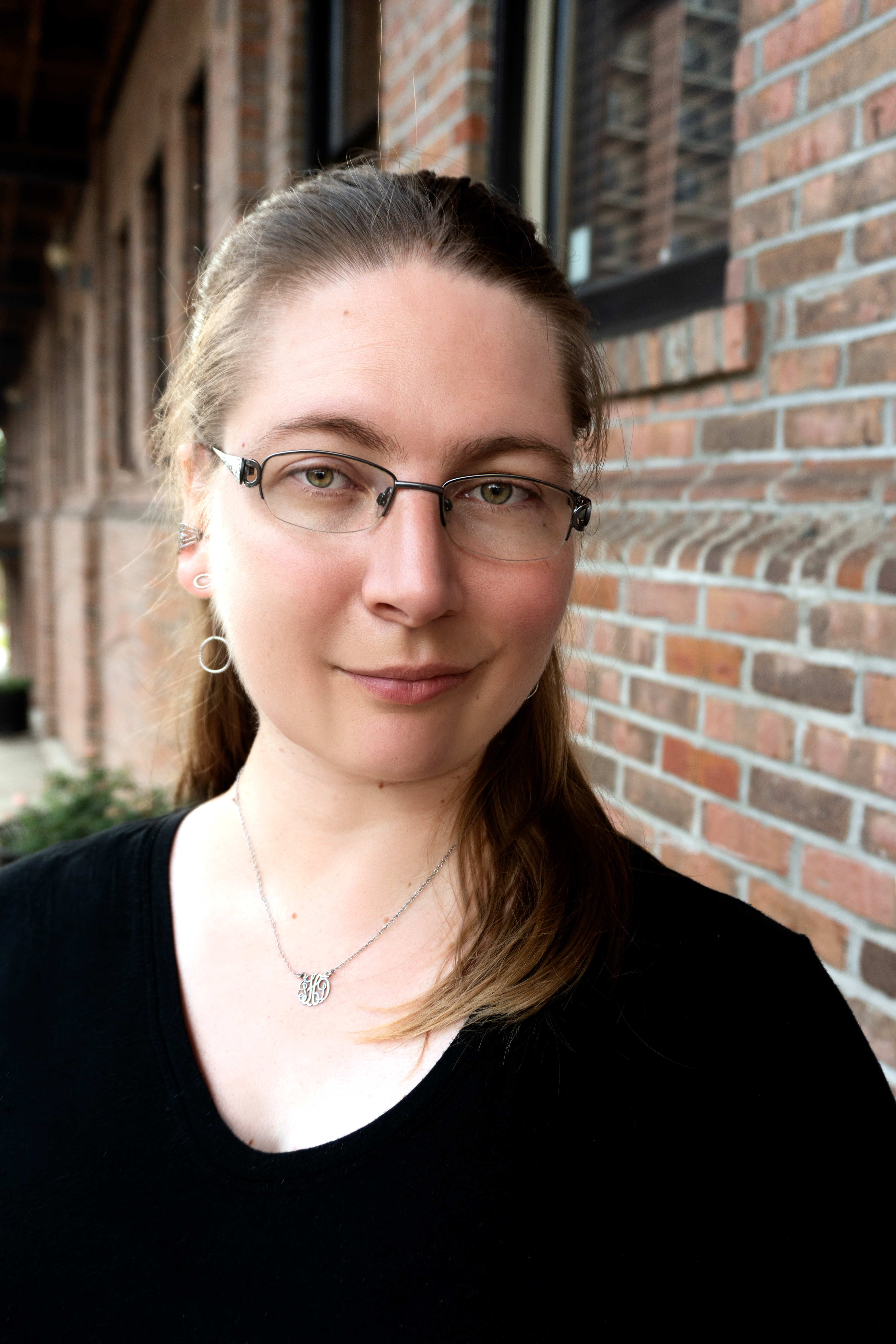
Jennifer Harding
COLLEGE OF MUSIC
Graduate Student Undergraduate Research Mentor Award
The Graduate Student Undergraduate Research Mentor Award for 2021 was presented to Jennifer Harding. Jennifer mentored Emily Coston in researching "Harmonic Characteristics of Music: A Computational Approach."
Graduate Student Undergraduate Research Mentor Award
Jennifer Harding
"My approach to mentoring rests upon two pillars: relationship and scholarship. The pillar of relationship is built from empathy, compassion, and honoring the humanity within each of my students. The undergraduate years come with a unique set of challenges: many students are away from home from the first time, navigating the transition from adolescence to adult- hood, and managing many more responsibilities than they have had before, to name just a few. For all the excitement and vibrancy of this time, students’ lives can also be overwhelming, confusing, and quite simply, difficult. Over the course of working with my students, I get a small peek into boththe triumphs and challenges they are experiencing. I make sure to check in with my students regularly, and adjust both my expectations and demands based on what they are able to take on. My students have the flexibility to take on less demanding tasks when they are overwhelmed, and more challenging tasks when they have the mental bandwidth to do so. I strive to respect the boundaries and limitations of my students while maintaining a rigorousprogram. I hope to model grace, understanding, and integrity to my students in the hope that they carry on this practice to their colleagues, and eventually their own mentees.
The second of the two pillars is scholarship. The mentoring and advising relationship is founded on the expectation of academic and scholarly excellence. Part of my job is to pull back the curtain to reveal the often circuitous and messy behind-the-scenes view of research, analysis, and communication. Then, I walk them through step-by-step how to navigate the research process. The first problem we approach is how to ask questions.This includes how to ask a good research question to initiate a productive line of inquiry, as well as how to ask questions, evaluate answers, revise, and repeat every step of the way. Curiosity and inquisitiveness is the lens through which I encourage my students to evaluate both all other aspects of research: reading the work of others, determining how to collect data, parsing the data, and communicating results. Together, my students and Iwork to develop their practical skills: how to procure resources, how to evaluate those resources (especially when an article is written at too-high a level), how to synthesize existing ideas with their own, and how to communicate clearly, succinctly, and in an engaging way without sacrificing information or depth. I work closely with my students at every stage of their research, directing them towards resources, talking through articles, and editing their writing both asynchronously and in real time. My hope is that my students will cultivate both the practical and cognitive skills to continue pursuing their research questions after our time together has ended."
—Jennifer Harding, from her research statement
"With this past year in UROP being my first time participating in extracurricular research, I could not have asked for a better mentor than Jennifer Harding. She is attentively invested in seeing me grow as a researcher and person, and it means the world to know somebody is looking out for me in this way. It is easy to feel like just another student in the sea of academics at FSU, but Ms. Harding provides me with the mentorship and guidance to know that my work means something and that my unique talents won't be lost in the crowd. Entering UROP, I thought I would only be working under a researcher to benefit their project, but Ms. Harding fosters my own interests and curiosity as well by putting immense time and effort into teaching me so much, purely for my benefit. I was beyond excited to join her music theory project, but what I didn’t know is that she would also help me form my own research question and give me the tools to explore it outside of the scope of her principal research.
Even though she is a rather busy graduate student, Ms. Harding is so generous with her time and attention, teaching me coding, music analysis, and running and understanding programs that pertain to both of our research. She goes above and beyond the UROP mentor requirements, and I actually feel like I am learning a whole extra class’ worth of material and skills through our time together. Ms. Harding does not simply spoon-feed me the information needed to be of service to her, but instead she puts care into intellectually challenging me and making sure I am learning, even if it means she personally gets a less-maximized benefit from my working under her in UROP.
Ms. Harding is an excellent mentor and teacher, who provides me with invaluable feedback. I can tell she makes an effort to understand my learning process so that she can meet me where I am and direct me forward from there. Ms. Harding does this so successfully because of how much she believes in my work, and it is easy to be invested in the project because of how much she believes in her own work as well."
—Emily Coston, UROP student 2020-2021, from her nomination letter

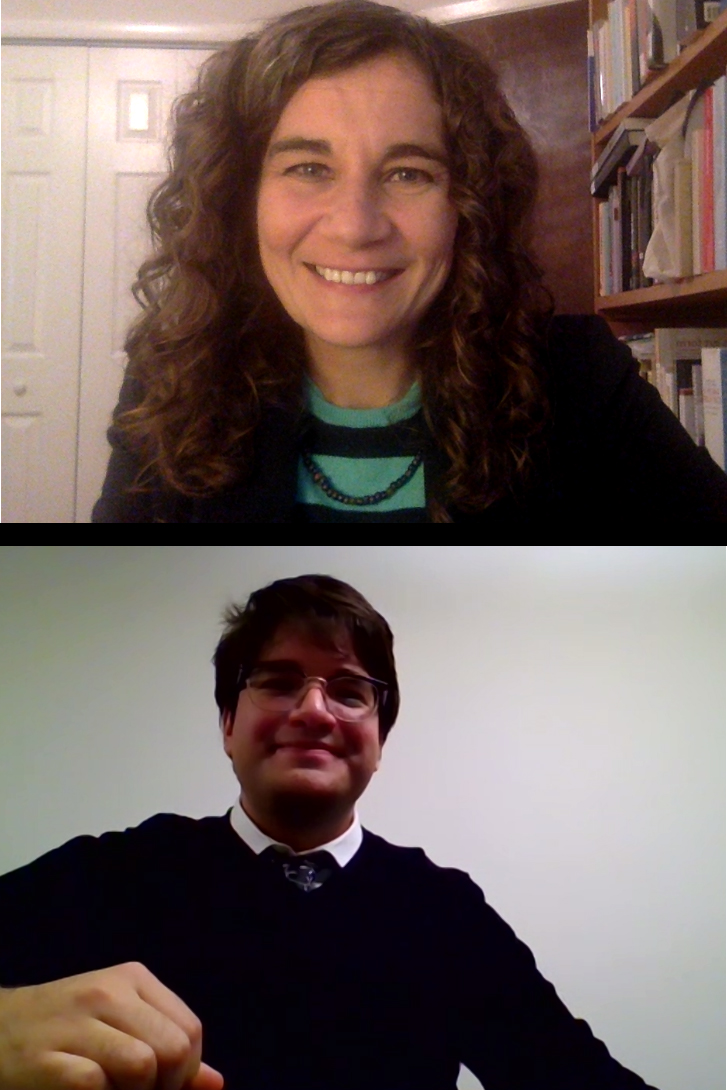
Dr. Elizabeth Coggeshall
MODERN LANGUAGES AND LINGUISTICS
Undergraduate Faculty Research Mentor Award
The Undergraduate Faculty Research Mentor Award for 2020 was presented to Dr. Elizabeth Coggeshall for mentoring UROP student Luis Sanchez in research about modern language, Italian, and Dante Alighieri.
Undergraduate Faculty Research Mentor Award
The Undergraduate Faculty Research Mentor Award for 2020 was presented to Dr. Elizabeth Coggeshall for mentoring UROP student Luis Sanchez in research about modern language, Italian, and Dante Alighieri.
 |
Dr. Elizabeth Coggeshall
"Close mentorship of undergraduate students in the fields of the humanities is essential, primarily because students arrive at college with little to no idea – not even a fictional one – of what professional humanities research actually entails and how collaborative it can be. I find that many students begin their college careers with a deep-rooted passion for the humanities, but have only a vague notion of what it means to do the work on a professional level.
In my role as a UROP mentor, I focus on the transferable skills that can be acquired through humanities data collection, fostering curiosity, rigor, and clarity of expression. I know that few undergraduate students who choose to collaborate with me on my project On the Resonance of Dante’s works in Contemporary Culture will go on to become scholars of medieval Italian literature, so I encourage students from the earliest stages to chart their own path within the landscape of the work that we do.The data that we collect in our archive vary greatly across different genres, media formats, content areas, and geographical provenances. I work closely with my UROP students to locate materials that most stimulate their curiosity, and then I encourage them to gravitate further toward those items for their independent research and creative projects. In doing so, I actively foster each student’s sense of ownership over the questions they ask and the ideas they produce."
—Dr. Elizabeth Coggeshall, from her research statement (Pictured with her nominating student, Luis Sanchez)
“Though teaching classes, writing books, and raising a child, Professor Elizabeth Coggeshall has dedicated the time to be an outstanding research mentor to me and others. Through her expertise and warmth, she has created lovers of Dante Alighieri and the Italian language out of her students. Being a young scholar, she knows how to effectively communicate with her mentees, and sincerely empathizes with the trials that undergraduate researchers undergo. She has supported me in my endeavors, in giving great feedback on my work, and in my best interest, has directed my attention toward many calls-for-papers and undergraduate journals. When she was sick with the flu, she still found the time to respond to my emails and even ask how I was getting along. Professor Coggeshall has talked me through personal problems, checked on me during my first conference out of state, and continues to insist on buying the coffee in each and every one of our meetings. She’s selfless, indefatigable, and so humble as to prefer my calling her 'Beth'."
—Luis Sanchez, UROP student 2019-2020, from his nomination letter
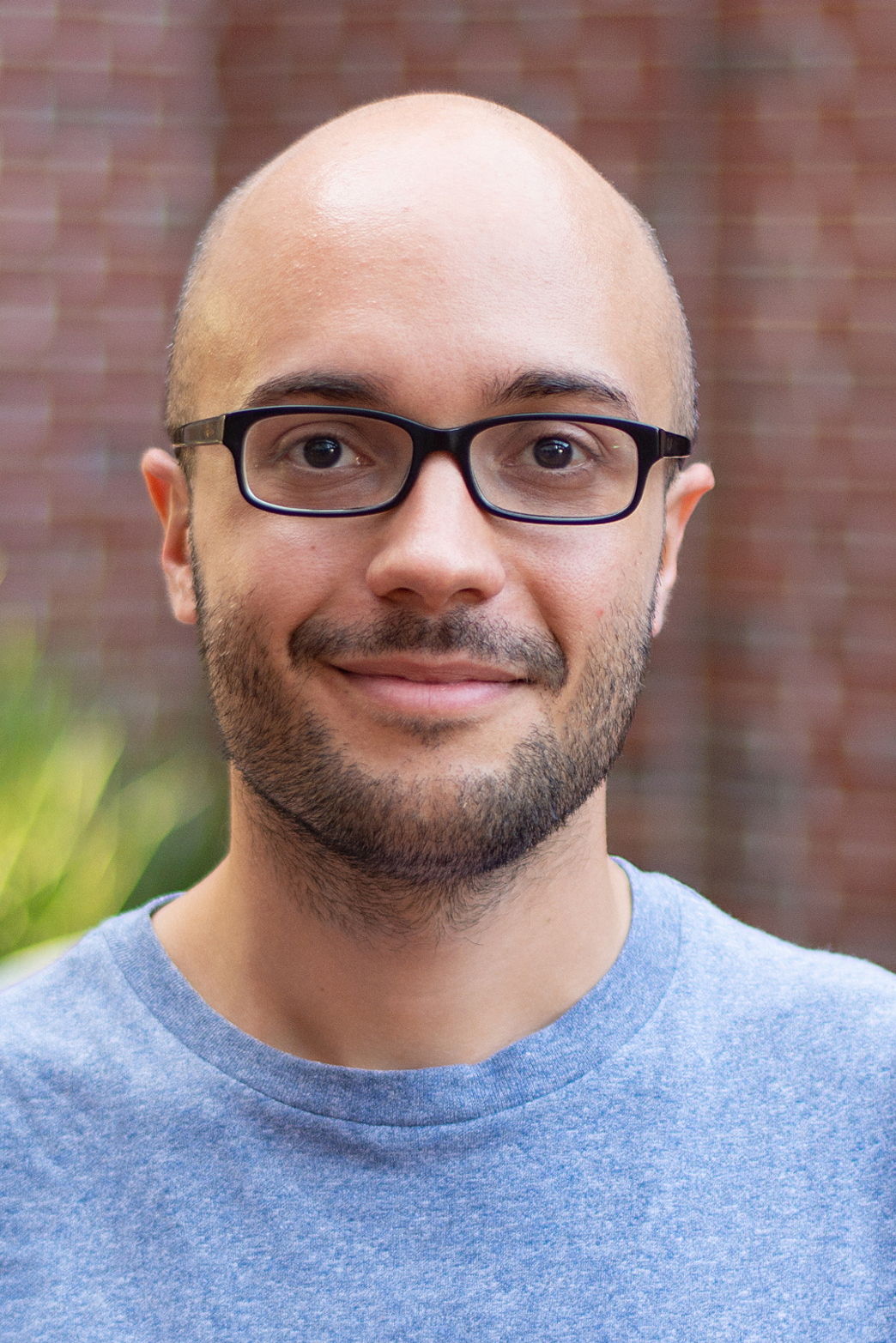
Dr. Lorenzo Ruffoni
MATHEMATICS
Post-Doc Undergraduate Research Mentor Award
The Post-Doc Undergraduate Research Mentor Award for 2020 was presented to Dr. Lorenzo Ruffoni. Dr. Ruffoni mentored UROP student Miguel Barquinero in mathematics beyond proofs and theory.
Post-Doc Undergraduate Research Mentor Award
Post-Doc Undergraduate Research Mentor Award for 2020 was presented to Dr. Lorenzo Ruffoni. Dr. Ruffoni mentored UROP student Miguel Barquinero in mathematics beyond proofs and theory.
"As a first-generation college student, I am deeply aware of the fact I can be a researcher today mainly thanks to the amazing mentors who have guided and inspired me through school and college. This is a debt that I am very excited to pay back by mentoring undergraduate students, initiating new minds to the pleasures of research.
My area of research is Pure Mathematics; the problems we are interested in are abstract, not quite motivated by applications or concrete problems, but rather by aesthetic taste: we choose problems because members of the mathematical community are fascinated by them. Finding other people with whom to work on a problem is somehow similar to finding friends who agree to try my favorite restaurant. As with colleagues, so with students, with one major difference: students are not expected to have a refined culinary taste, nor even to know how to use utensils. When mentoring undergraduate students, my main objective is helping them to gain technical knowledge so they can transition from the status of student to that of collaborator. It is one of the most rewarding things I have ever tried to do. When it happens, my research gets a scientific boost too, as an inexperienced collaborator is an unbiased collaborator, able to bring a fresh point of view to the project."
—Dr. Lorenzo Ruffoni, from his research statement
"At the start of my first semester in UROP, I knew nothing more than just the theory, Dr. Ruffoni additionally introduced me to the world of formal mathematics. It is vastly apart from the classroom mathematics with which most students are familiar. The proofs must explain everything, and I mean EVERYTHING. He taught me how to create abstracts for a variety of audiences, from the randomness of the UROP Symposium to the quite informed and knowledgeable audience of mathematics conferences. At the start of my first semester, I knew nothing about Group Theory or Abstract Algebra, much less Right Angled Artin Groups. It is a testament to Dr. Ruffoni's guidance and mentorship capabilities that I was able to go from such a position to coauthoring what will likely be peer reviewed paper, publishable to an official journal."
—Miguel Barquinero, UROP student 2019-2020, from his nomination letter

Katherine Musacchio Schafer
CLINICAL PSYCHOLOGY
Graduate Student Undergraduate Research Mentor Award
The Graduate Student Undergraduate Research Mentor Award for 2020 was presented to Katherine Musacchio Schafer. Katherine Musacchio Schafer mentored Gabriela Herrerias and Summer Grace Fulcher in researching meta analysis on the risk and preventive factors of veteran suicide.
Graduate Student Undergraduate Research Mentor Award
The Graduate Student Undergraduate Research Mentor Award for 2020 was presented to Katherine Musacchio Schafer. Katherine Musacchio Schafer mentored Gabriela Herrerias and Summer Grace Fulcher in researching meta analysis on the risk and preventive factors of veteran suicide.
Katherine Musacchio Schafer
"Imagine meeting over a dozen undergraduate students, all of whom excitedly and emphatically want to collaborate with you. Imagine their eagerness to contribute, so many good ideas, and obvious potential for academic success. Now imagine the impossible task of choosing just two. Choosing two who will be smart, quick, efficient workers. Choosing two who will happily meet with you until the project is done. And most importantly, choosing two who will be kind, lighthearted, and a joy to work with. As a Undergraduate Research Opportunity Mentor that was my task.
Working with Gabrielle Herrerias and Summer Fulcher is one of the greatest joys during my time as a Florida State University graduate student. They challenge me, even by their mere presence, to conduct strong and bold academic research. I am immensely grateful for our time together.
I often consider myself lucky to be working with such strong UROP researchers. I routinely ponder my good fortune in working with them. I wonder if working with such competent and kind students is good luck, or if there is something more. Will I be able, as I continue my academic career, replicate this success and continue to work with strong upcoming scientific researchers? Being a scientist, I keep a running list as to some hypotheses that led me to working with Gabrielle and Summer. This is a “living document” that I am sure will over time, as I learn who I am as a mentor. But this is a good start, and I hope to continue the good fortune of wonderful mentoring in the future."
—Katherine Musacchio Schafer, from her research statement
"My research mentor Katherine Musacchio Schafer is truly one of the best mentors I have had to this day. As a first time student in the UROP program, the first few weeks in the program could be quite nerve racking as you embrace yourself for the weeks of interviews and meetings with research mentors ahead. Katherine was in the process of conducting a meta analysis on the risk and preventive factors of veteran suicide. With ease I responded that my grandfather was a veteran and I know plenty of others who are as well and the topic had resonated with me. She could see the genuineness in my answer and was really astonished. Katherine later contacted me asking if I would be willing to be a part of her research team and at that moment it was an offer I could not refuse."
—Gabriela Herrerias, UROP student 2019-2020, from her nomination letter
"Katherine Schafer is one of the most outstanding leaders that I have had the honor of working with at Florida State. Anyone who knows her knows how passionate she is about her research and how it will be used to benefit the lives of others. From the beginning of my assistantship, it has always been clear how deeply she cares for her studies, her family, and her students. Katherine Schafer truly has a heart for others, and this can be observed in everything she does. Her mentorship and careful guidance has opened so many doors for me and for her other students who seek to achieve great endeavors. I can not express in words how grateful I am for everything she has allowed us to learn from her, and I earnestly look forward to working with her in the future."
—Summer Grace Fulcher, UROP student 2019-2020, from her nomination letter


Undergraduate Research Faculty Mentor Award
The Undergraduate Research Faculty Mentor Award for 2019 was presented to Dr. Paul Conway for mentoring UROP student Kailyn O'Connor in research about morality and justice and how people think about good and bad.
Dr. Paul Conway (nominated by UROP student Kailyn O'Connor)
"Over the past three years, I have mentored six honors students, two UROP students, and fourteen directed independent studies students (though one name appears twice). My style of mentorship tends to involve not only regular laboratory meetings where the whole lab discusses relevant research, but also working one-on-one with each student to develop a novel empirical hypothesis, design measures to operationalize and manipulate the constructs in question, obtain ethics clearance, make the actual questionnaire, obtain participants, and analyze the results together, before crafting posters and manuscripts together. In other words, I treat undergraduates like graduate students—collaborators in generating, testing, and communicating cutting-edge science.
Naturally, then, my style of mentorship involves hours and hours of time spent together with students in my office doing science. Sometimes my colleagues suggest I spend too much time this way, but in my view the process is useful. Students get steeped in psychological theory as they work to first derive hypotheses and later compare their results to expectations and previous research. Along the way, students organically pick up skills in designing research, analyzing data, and presenting results. We discuss each of these steps as they come up in the process of doing research before performing the steps in question. This facilitates deep learning and retention because each concept is immediately self-relevant."
— Dr. Paul Conway
"Dr. Conway made my experience in UROP much more fulfilling than I expected it to be. He had faith in me to basically run a whole study on my own with his guidance when I had never done anything in research before. I had a wonderful opportunity of running my own experiment and getting first hand experience in the field. Dr. Conway was a wonderful mentor to have. Because this was my first time every doing research I was very confused in the beginning. Dr. Conway was patient with my confusion, answered all of my questions and helped me every step of the way. Not only was I involved in my own research but he also got me involved with several other projects that he is mentoring. With those other projects I got even more first hand experiments by running participants in the lab for a few hours every week. I am so thankful for everything that Dr. Conway has taught me and I look forward to working with him in continuing my research." – UROP Student Kaitlyn O'Connor
Dr. Peter Cheetham
COLLEGE OF ENGINEERING/COAPS
Undergraduate Research Post-Doc Mentor Awards
The Undergraduate Research Post-Doc Mentor Awards for 2019 was presented to Dr. Peter Cheetham. Dr. Cheetham mentored UROP student Alexia Mullings in researching superconductive materials at the Center for Advanced Power Systems.
Undergraduate Research Post-Doc Mentor Awards
The Undergraduate Research Post-Doc Mentor Awards for 2019 was presented to Dr. Peter Cheetham. Dr. Cheetham mentored UROP student Alexia Mullings in researching superconductive materials at the Center for Advanced Power Systems.
Dr. Peter Cheetham (nominated by UROP student Alexia Mullings)
Alexia Mullings left, Dr. Peter Cheetham right
"My philosophy in mentoring undergraduate student researchers is to nurture their scientific curiosity, critical thinking, and problem solving skills. The nurturing process is multifaceted, as it encompasses the development of both their scientific and technical skills as well as their personal and professional skills.
The students I have mentored are from diverse backgrounds and varied science and engineering majors. However, there are a few firsts all of them are exposed to when working with me. My major research focus is on the development of superconducting power cables which is primarily hands on research with a direct real-world application. For the undergraduate researchers, this is their first time working in an engineering laboratory setting, first time working with the constraints of the real world, first time realization that cost is an important constraint when solving an engineering problem, and first time they are expected to learn from the failures, which are part of the research and development process. These are a lot of firsts the students will experience as part of working under my mentorship. When you consider this is only a part-time 10 hours per week position, these are the areas that I must emphasize when mentoring." — Dr. Peter Cheetham
"Dr. Peter Cheetham has demonstrated outstanding guidance and mentoring during my UROP research project by giving me the opportunity to observe projects and experiments that take place at the Center for Advanced Power Systems, even when they do not involve my own research, in order to give me the opportunity to gain more exposure to real life projects and environments that engineers work in. Through my research I have learned an extensive amount about superconducting materials due to the resources provided to my by Dr. Cheetham. He has also given me the chance to branch out and learn more about 3D printing by working more closely at the InnovationHub with the people who work there. He has also given me tutorials on the Comsol and SolidWorks programs, which is exciting to me because not many first-year students are exposed to these tools. Dr. Cheetham has made an effort to always be available to myself and his other undergraduate research assistants as a source of guidance whenever we have any questions and I greatly appreciate it." — UROP student Alexia Mullings

Kate Hill
BIOLOGY
Undergraduate Research Graduate Student Mentor Awards
The Undergraduate Research Graduate Student Mentor Awards for 2019 was presented to graduate student Kate Hill. Kate Hill mentored Elizabeth Campos in researching sponges and their ecosystems.
Undergraduate Research Graduate Student Mentor Awards
The Undergraduate Research Graduate Student Mentor Awards for 2019 was presented to graduate student Kate Hill. Kate Hill mentored Elizabeth Campos in researching sponges and their ecosystems.
Kate Hill (nominated by UROP students Elizabeth Campos)
"A good mentor can foster a student’s interest in a subject area, help them develop lifelong skills, and provide career guidance. My undergraduate experience was largely shaped by my mentor, and his support and interest in my development as a scientist changed my career trajectory. With this great responsibility in mind, I aspire to help my mentees create original projects, cultivate transferrable skills, and explore future career paths.
Student investment in research is built from curiosity and sustained by the student having ownership of a project. My relationship with each mentee begins when they read a paper from the primary literature in preparation for interviewing for a position in the lab. Reading the paper gives us a shared experience, and I open the interview by asking them what interested them and what challenged them about reading the paper. I listen for what interests them, as this may point to a future direction for their research project. Discussing the scientific paper sets the tone that I value their input and that I believe that they are capable scholars. As students begin working in the lab, I encourage them to ask questions and make observations to promote their curiosity, independence, and critical thinking skills. For example, one of my students noticed that different sized sponges had different symbiont communities. Using her observation, I guided her through the process of posing a scientific question, collecting and analyzing data, and preparing the results for a presentation at the Undergraduate Research Symposium. By helping students design projects inspired by their observations, students are more invested in the research project. As a result, they tackle more" — Kate Hill
"Kate Hill has demonstrated outstanding guidance and mentorship through the time of our UROP study. Kate exemplifies the meaning of constant support and dedication to her work and has shown me a new light to the research field. She goes out of her way to help my cohort and me with our projects and has shown us the diverse aspects that build a researcher.
When I first began on this project, I had no idea of the complexity and beauty behind sponges and the tiny ecosystem that lives in and around it. Her passion for this project and the creatures that live within the sponge motivates me to come into the lab and discover something new. Whenever I would get confused about a certain aspect of the sponge, she would help me understand and build my own answer out of the problem while providing resources such as academic literate to further learn about sponges. Whenever I get stuck on my project, she guides me in the right direction and allows me to realize where I make a mistake and then correct to learn from that experience. She has extended me different opportunities and programs such as Research Experiences for Undergraduate and is aiding me through this application process. Kate has inspired me to pursue my master’s in biology and has kindled a fire in me to pursue research head-on. She takes her time to explain the wonderful reality of the research field and how she’s made progress.I will always be grateful for the opportunities and guidance Kate has given me through this program. She has surpassed my expectations and has encouraged me to keep thinking outside of the box, or in this case, around the sponge." — UROP Student Elizabeth Campos.

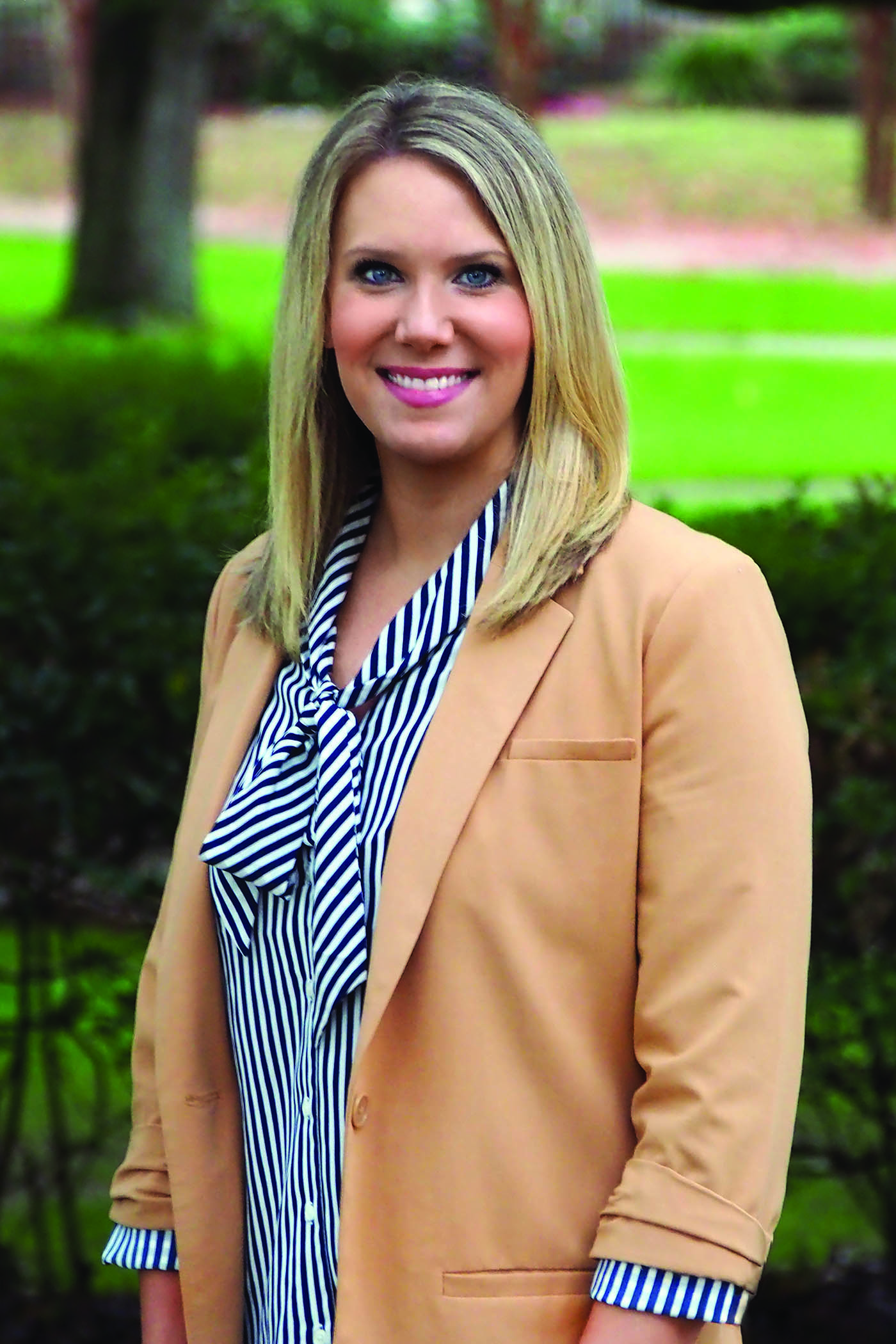
Undergraduate Research Mentor Award
The Undergraduate Research Mentor Award for 2018 was presented to Dr. Meredith McQuerry for mentoring UROP student Reannan Riedy on a project that aims to investigate printed cooling technology on T-shirts.
Read more about Dr. McQuerry’s work here.
Dr. Meredith McQuerry (nominated by UROP student Reannan Riedy)

Dr. Meredith McQuerry
"My overarching philosophy for mentoring and guiding undergraduate students through the research process is to “lead by example.” I strive to provide students with sufficient resources to tackle challenges and answer difficult questions independently, feeling comfortable to seek my guidance as necessary. My approach begins with introducing students to a research topic or problem and guiding them towards a comprehensive understanding of the subject. In some cases, the definition of the research problem is outlined by my ongoing projects, but other times, the students come forward with their own individual research interests. I do believe the latter is my favorite: to observe a student as they blossom in their understanding of a subject and to watch their self-confidence and pride grow as they discover the ability to design, execute, and analyze their own independent research.
[I also strive] to engage students in the broader research community on the local, national, and international stage. My students have presented posters and given research presentations at FSU events, regional consortiums, and international conferences. I encourage students to take advantage of every opportunity to build their network and gain confidence in their presentation skills. I strongly believe in supporting students in this type of outreach as I would not be where I am today had it not been for my research mentors providing me with the same opportunities.” – Dr. Meredith McQuerry
"An “inspiration" is really the best way that I know how to describe Dr. Meredith McQuerry. Although this was her first year inviting UROP students onto her project, it was very clear that she wanted to do the best she could for the sake of the students…Some of her UROP students came in with no knowledge on the field of textile quality assurance, but her commitment to providing us guidance through these past two semesters has been outstanding. Her door is always open to both her lab assistants and her numerous students throughout the Retail Entrepreneurship program, despite the numerous projects she is working on. Dr. McQuerry provides us with the means to do our own literature reviews and come up with our own ideas, and is even willing to implement these ideas into her own projects. For example, when I came to her saying that I was interested in visually assessing a component of our research on a microscopic level, [so] she put me in touch with a contact at the MagLab and generously added my idea to the project.
Beyond being a truly wonderful person and educator, Dr. McQuerry's research portfolio is both impressive and impactful. Dr. McQuerry's research serves to help real people in the real world as they perform their everyday jobs. The project that the UROP students are assigned to focuses on testing the durability of t-shirts with an active cooling finish. These shirts are designed specifically to benefit migrant workers who work in an agricultural setting. The phase change material (PCM) cools the human body down when it reaches a specific temperature.
I will be forever grateful for the opportunities and support that Dr. McQuerry has provided me with during this experience. I have learned more than I ever though I would about research and have truly developed a love for it. Not only does Dr. McQuerry excel as a researcher and an educator, but she also impacts her students' lives every single day." – UROP Student Reannan Riedy

Henry Cuddy and Joshua Gagnier
HISTORY AND CHEMISTRY (RESPECTIVELY)
Undergraduate Research Post-Doc/Graduate Student Mentor Awards
The Undergraduate Research Post-Doc/Graduate Student Mentor Awards for 2018 were presented to graduate students Henry Cuddy and Joshua Gagnier. Henry mentored UROP student Sergio Carlos Tamez in researching carpentry in 17th century Spanish Florida. Joshua mentored both Madison Orlowski and Luciana Villarroel in researching organic synthesis with microwaves.
Undergraduate Research Post-Doc/Graduate Student Mentor Awards
The Undergraduate Research Post-Doc/Graduate Student Mentor Awards for 2018 were presented to graduate students Henry Cuddy and Joshua Gagnier. Henry mentored UROP student Sergio Carlos Tamez in researching carpentry in 17th century Spanish Florida. Joshua mentored both Madison Orlowski and Luciana Villarroel in researching organic synthesis with microwaves.
Henry Cuddy (nominated by UROP student Sergio Carlos Tamez)

Henry Cuddy (right) and Sergio Carlos Tamez (left)
“My primary intentions for applying for a UROP mentee were simply to have someone share in my boundless love for Spanish colonial history and to give someone the opportunity to earn a publication credit for their contributions to my research article. I will happily admit that I was not prepared for the quality of assistance I was given by Sergio, and I realized my folly almost immediately after our initial interview. The students who apply for research assistantships through UROP are dedicated, driven, creative, inexhaustible, and have an immense desire to learn. I wanted to match that enthusiasm with my own passion for this project and sharing the experiences and tools I have acquired in my own academic career…Sergio comes from a different academic background than I do and has an immense drive and enthusiasm that I have tried to foster with this project. I encourage him to share his ideas and input whenever possible to strengthen the project and take it down new avenues that I might never have considered on my own. It is my belief that a mentor-assistant relationship is not beneficial for either party unless both learn something new from the experience. Sergio's perspective and contributions to my research are instrumental to my project and the challenge of viewing my work as a teaching tool has undeniably strengthened its overall coherence and value." - Henry Cuddy
“Working with Henry Cuddy on his research project in UROP this year has been an incredible experience. Henry has a passion for living history and ensuring that marginalized voices and people are heard and seen, and his research into the carpenters at Mission San Luis, who were in fact Apalachee Native Americans, showed just that. The research that we did required that Henry fly to Sevilla in Spain to collect 17th and 18th century Spanish documents so that we could transcribe and translate them. Although I am a native Spanish speaker, transcribing and reading 17th century Spanish script was very difficult. Henry provided excellent resources for learning how to read the unique Spanish abbreviations that helped me become more confident in my transcriptions, and also gave me my first experience in working with historical primary documents. I plan to attend graduate school for ancient history, so having experience and the skills to read difficult ancient documents is critical for my future goals, and I’m grateful Henry helped me through some of the more tedious transcriptions. Most importantly, Henry became a valuable mentor for me, an out gay person, because he is an openly transgender man pursuing graduate work in history. When I first met Henry, he had just begun his transition…and in our interview he was open about the challenges that he would be facing this year as we worked together. Seeing an openly LGBTQ person studying history at the post-graduate level and working in a living history museum, interacting with and educating students, was a powerful moment for me. Classics and History faculties, unfortunately, are still overwhelmingly white, male, and straight, and sometimes that can be discouraging for LGBTQ and POC students who want to be professors and pursue Ph.Ds. But Henry’s research demonstrates the valuable insights diverse researchers can bring to academic discourse…” - UROP Student Sergio Carlos Tamez
Joshua Gagnier (nominated by UROP students Luciana Villarroel and Madison Orlowski)
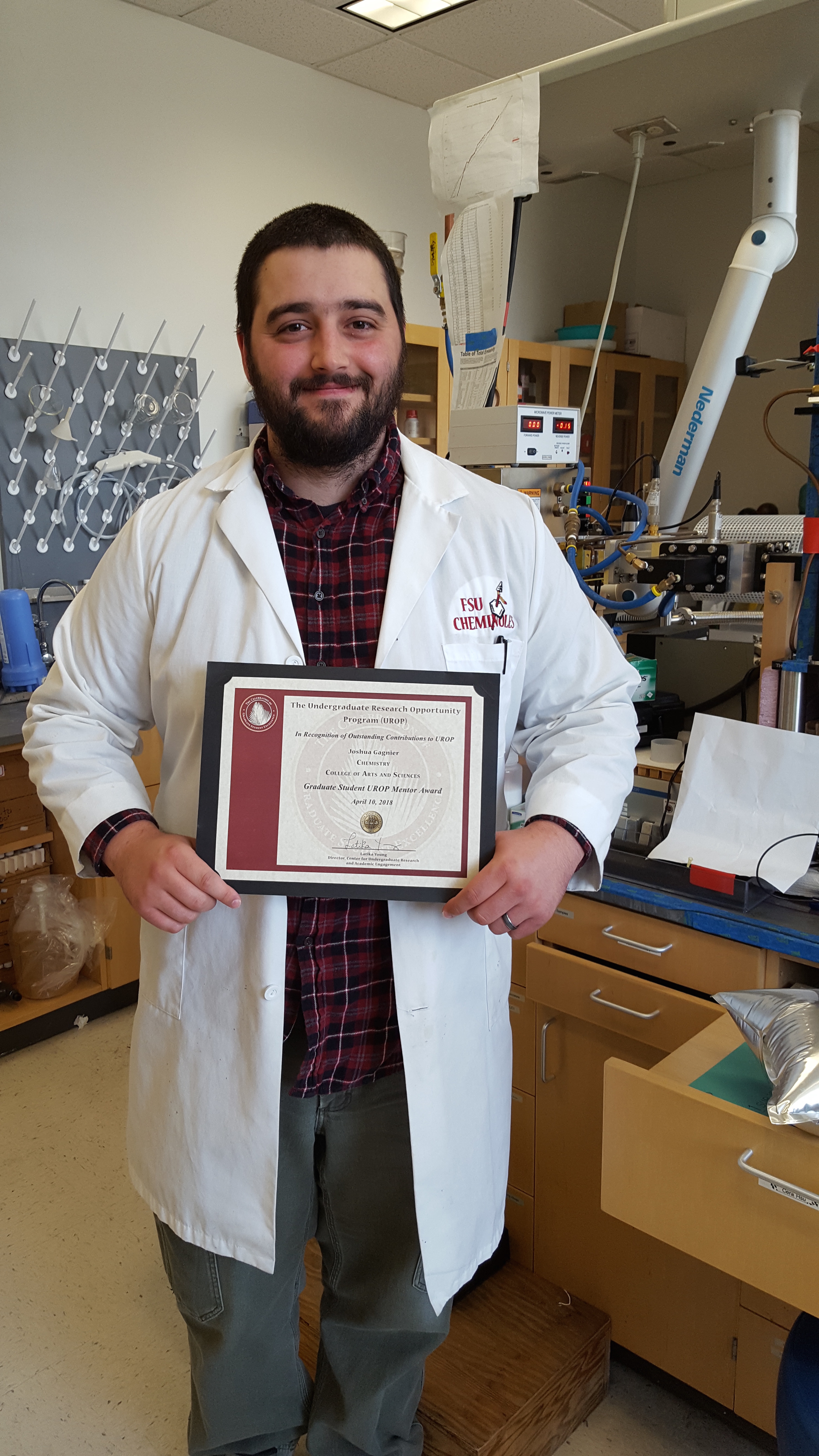
Joshua Gagnier
“My goal when I mentor an undergraduate is to make them a better researcher and scientist so that the scientific community can prosper, in particular my field of chemistry. With current academic standards pushing STEM programs, it becomes clear that the people within any STEM program must be well versed in their field of study as well as other fields. They must find ways to connect their views with the world around them and be able to analyze all things to the best of their ability. With this in mind I utilize what I term the “See-Do-Teach” method. I apply this method as I teach my research assistants the process of being a scientific researcher beginning with simple techniques before moving to more advanced techniques, and intermittently discuss theory eventually leading them to how they can branch off without my guidance. The use of a mentor is quite helpful for growth of a new researcher. When I started research, my very first day my professor told me what my project was, what reaction I needed to begin with and said good luck. I was thrown to the wolves with almost no experience, and no immediate guidance. It took me a while to grow as a researcher, and my thoughts went to the old saying about teaching a man to fish, and how someone would learn to fish without a teacher. I often recall my struggle and failures, yet somehow got enough results to publish my first paper. Overtime I grew as a researcher, and after coming to graduate school feel more confident in my abilities. I mentor my students as to bypass the mistakes and pitfalls I made, so that they can grow faster. I view every opportunity as a teaching moment whether successful or otherwise.” - Joshua Gagnier
“Josh has been a wonderful mentor and has graciously answered all the questions I have had regarding to the lab and beyond. Like Josh, I have plans to go to graduate school for Chemistry. His wisdom about Chemistry, the process of applying to and attending graduate school, and life in general has made him a life mentor, not just a research mentor. He has inspired me to get more involved in the Chemistry department at FSU and to continue doing research after he graduates in the Fall. His passion for Chemistry and research are undoubtable after witnessing some of the late-nights and weekends he spends in the laboratory. In the few months I have known Josh, he has inspired me to be a better Chemist, inquirer, and student." - UROP student Luciana Villarroel
“I was accepted to a research position under Josh in an organic chemistry lab, even though I have never taken organic chemistry in my life. This demonstrates, above anything, what a great teacher Josh is. How far I, individually, have come in my knowledge of chemistry is astounding. This is all due to Josh’s diligence, mentorship, compassion, and willingness to teach with the patience to explain the answer to any question, no matter how complex or simplistic. He assigned me chapters to read and practice problems from the organic chemistry textbook to help me catch up, and reviewed answers and explained to me anything and everything I failed to understand… I have learned so much through this research experience and through Josh’s mentorship. Not only have I discovered the meaning and process of research, but I am familiar with a laboratory setting and I feel comfortable with real-life chemistry. Not to mention, when I finally do take Organic Chemistry I this fall, it’s safe to say it won’t be nearly as challenging. All of these benefits I have acquired through working in the lab are due to Josh’s dedication to not only his research, but to sharing his research with me.” - UROP Student Madison Orlowski

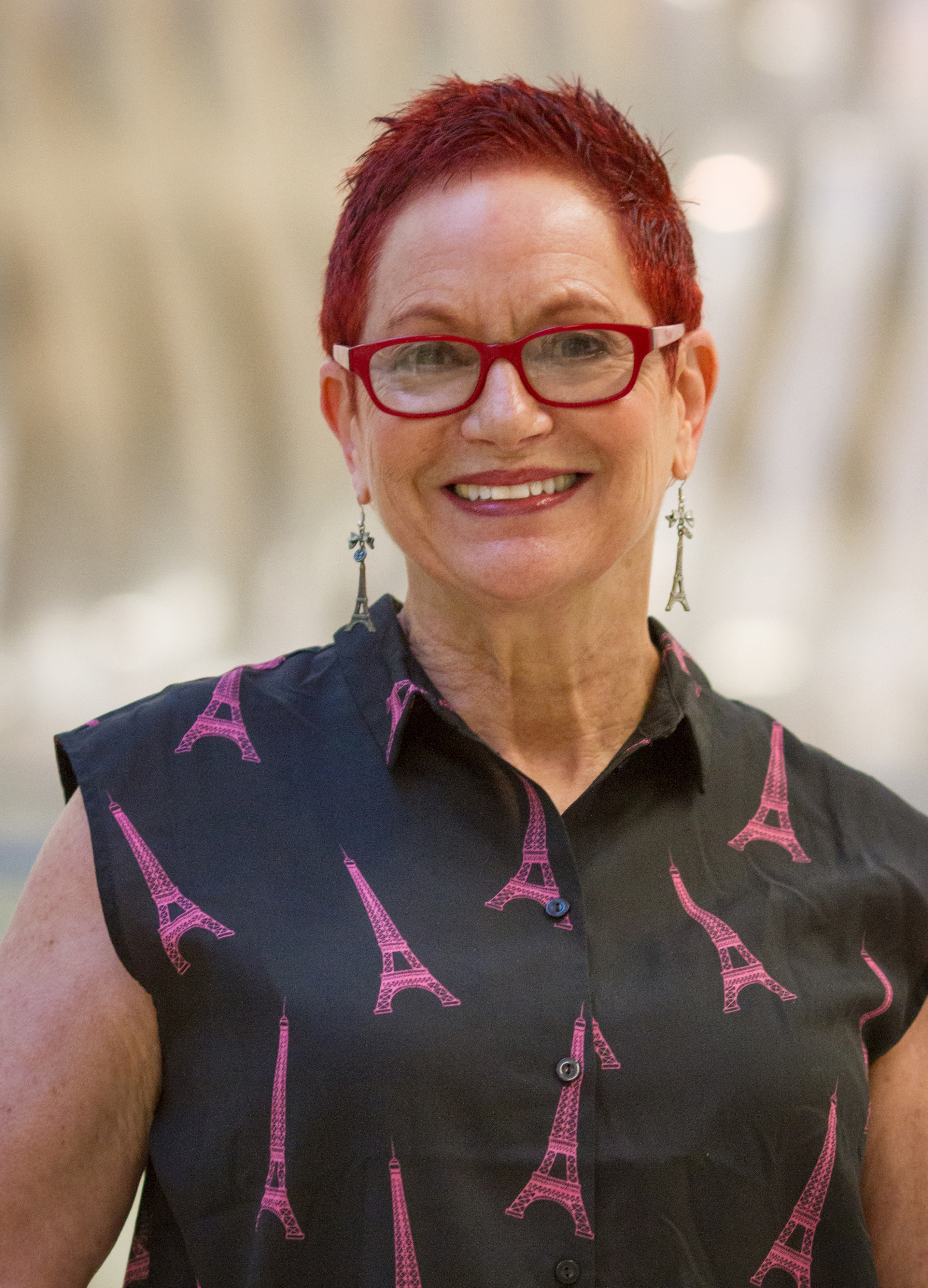
Dr. Lauren Weingarden
DEPARTMENT OF HISTORY
Undergraduate Research Mentor Award
The Undergraduate Research Mentor Award for 2017 was presented to Dr. Lauren Weingarden for mentoring UROP Chase Van Tilburg on a project that aims to digitize a collection of 2,000 19th-century stereocards.
Undergraduate Research Mentor Award
The Undergraduate Research Mentor Award for 2017 was presented to Dr. Lauren Weingarden for mentoring UROP Chase Van Tilburg on a project that aims to digitize a collection of 2,000 19th-century stereocards.
Read more about Dr. Weingarden’s work here.

Dr. Lauren Weingarden
“Whether serving as an Honors in the Major director or as a UROP mentor, I have encouraged my students to think outside the box and to cultivate projects that foster intellectual exchanges across the university community.” – Dr. Lauren Weingarden
"Dr. Lauren Weingarden has been an amazing and inspiring mentor. From the beginning, she was adamant about me making the project I was assisting on my own and expanding upon it. Her energy always pushes me to dig deeper and push my work further… Because of her I have stepped out of my comfort zone and have started to create something really amazing with my research. Dr. Weingarden has instilled a passion in me for research that I never thought would be there and has greatened my undergraduate experience." – UROP Student Chase Van Tilburg
The Undergraduate Research Post-Doc/Graduate Student Mentor Award for 2017 was presented to Ciera Lorio for her role in mentoring UROP student Jenna Wolff in the research of communication disorders in children.
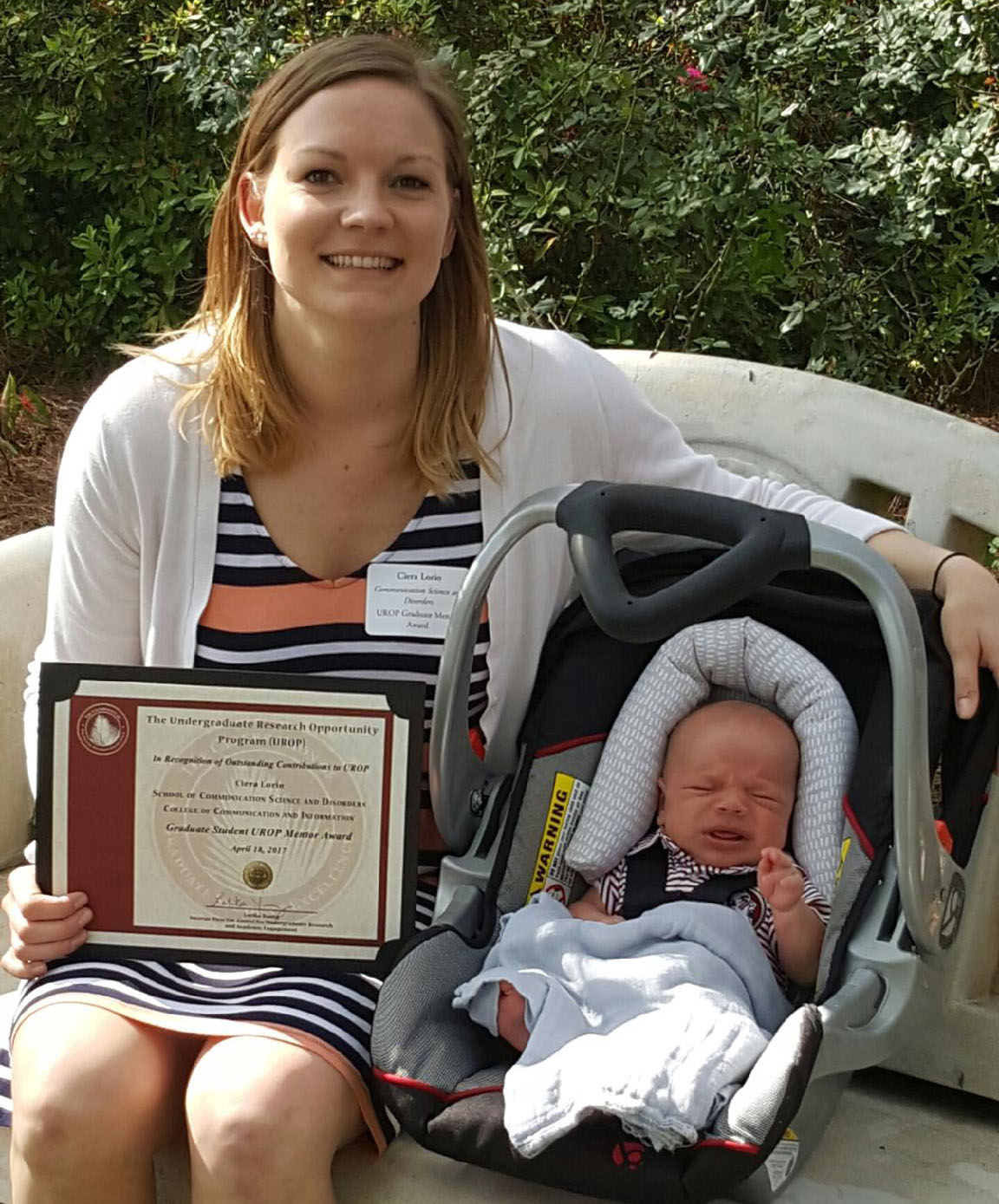
Ciera Lorio with her son August
“As a mentor, I may be the first person to formally introduce a student to the world of research. My goal is to show students that research is not ‘boring’ or ‘scary’, and that it can actually be fun! I strive to provide undergraduate students with an experience that does not start and stop at data collection and video coding; I want my students to be actively involved in the entire research process.” – Ciera Lorio
“While my UROP colloquium was useful for learning general information about research, Ciera taught me the vast majority of what I learned this year. Her calm, and quiet manner paired with her wealth of knowledge on the subject matter made her an incredible mentor. She helped guide me in the right direction when needed, but also gave me some flexibility so that I could grow as a student and as a researcher.” – UROP Student Jenna Wolff

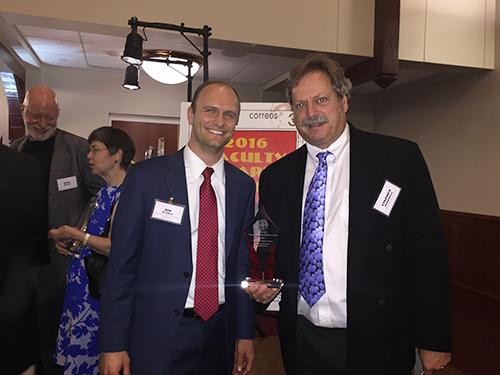
Dr. Steve McDowell
cOLLEGE OF COMMUNICATION AND INFORMATION
Undergraduate Research Mentor Award
The Undergraduate Research Mentor Award for 2016 was presented to Dr. Steve McDowell for his role in mentoring UROP student Matthew Hebron on his research into how media covers diplomatic conflicts. Dr. McDowell has mentored several UROP students this year and in years past.
Undergraduate Research Mentor Award
The Undergraduate Research Mentor Award for 2016 was presented to Dr. Steve McDowell for his role in mentoring UROP student Matthew Hebron on his research into how media covers diplomatic conflicts. Dr. McDowell has mentored several UROP students this year and in years past.

Dr. Joe O'Shea (left) with Dr. Steve McDowell
"I have been privileged to work with some exceptional undergraduate students during my career at Florida State University, and especially during the last three years with students in the UROP program. In these and other activities I have sought to engage and include undergraduate students at the level to which they are ready and willing to respond and move forward.” - Steve McDowell
"Dr. McDowell has encouraged me to transcend expectations of an undergraduate freshman. I will have presented at three conferences by the end of this year and he has offered to assist me in publishing a paper on my project. By provoking me to think critically about my own work, Dr. McDowell has prepared me well to present my research among respected faculty and fellow students.” - Matthew Hebron, UROP Student

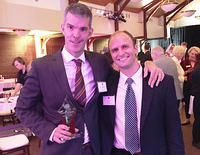
Dr. Charles Upchurch
DEPARTMENT OF HISTORY
Undergraduate Research Mentor Award
The Undergraduate Research Mentor Award for 2015 was presented to Dr. Charles Upchurch for his role in mentoring UROP student Erin Trumble in research of the humanities.
Undergraduate Research Mentor Award
The Undergraduate Research Mentor Award for 2015 was presented to Dr. Charles Upchurch for his role in mentoring UROP student Erin Trumble in research of the humanities.

Dr. Charles Upchurch (left) with Dr. Joe O'Shea
"Undergraduate research is the future of the humanities at the university level.... For my undergraduate research assistants, such as those within the UROP program, my assumption is that they are considering careers in research, and so I design tasks that allow them to see the multiple steps a project goes through, from initial idea to published work."--Charles Upchurch
"I have benefited immensely from my UROP experience and much of it is due to the efforts of my mentor, Professor Upchurch. My understanding of the research process in our field was clearly important to him.... The fact that he asked for and valued my opinion made me feel as if I was more ingrained in the research. Professor Upchurch made sure that I had the mental skills to better understand how to approach research. More, he inspired me to continue doing research by giving me the tools with which to do it and making me realize that doing my own research project was completely within my capabilities." Erin Trumble, UROP student

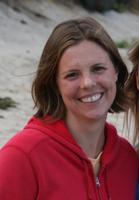
Dr. Elizabeth Stroupe
BIOLOGY
Undergraduate Research Mentor Award
2014's Undergraduate Research Mentor Award was presented to Dr. Elizabeth Stroupe (Biological Science) for her guidance of an undergraduate studying properties of an unusual DNA structure, known as a G-quadruplex, as well as their protein partners. Research shows that these structures are directly connected with human diseases like cancer.
Undergraduate Research Mentor Award
2014's Undergraduate Research Mentor Award was presented to Dr. Elizabeth Stroupe (Biological Science) for her guidance of an undergraduate studying properties of an unusual DNA structure, known as a G-quadruplex, as well as their protein partners. Research shows that these structures are directly connected with human diseases like cancer.

"My objective is to guide students in my laboratory so they grow into independent, mature researchers who take responsibility for their own research question. I use a hierarchical strategy to teach laboratory skills in stages of increasing sophistication so students learn to puzzle about questions until they can find the answer. I foster a collaborative environment where this individual learning occurs in a supportive environment. Regardless of a student's path in life, I feel these are lessons that will serve him or her well." --Elizabeth Stroupe
"Dr. Stroupe treats undergraduate students like we are her colleagues. She will always listen to questions carefully and with full attention,and give very thorough response," said Trevia Jackson, nominating student.
As always, if you have any questions, please feel free to contact Latika Young, Director of the Center for Undergraduate Research and Undergraduate Research.
